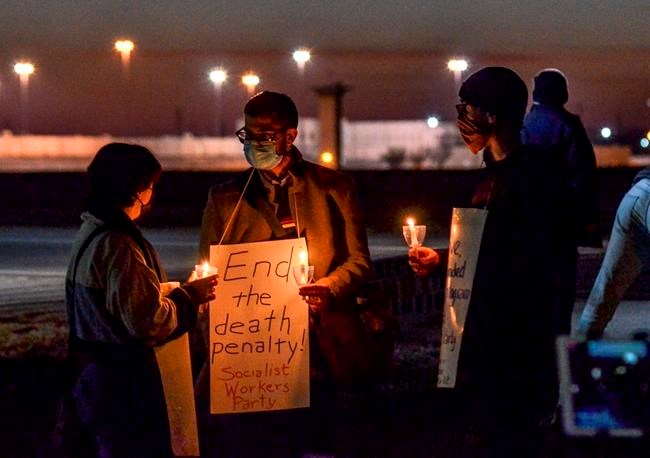TERRE HAUTE, Ind. — The Trump administration continued its unprecedented series of post-election federal executions Friday by putting to death a Louisiana truck driver who severely abused his 2-year-old daughter for weeks in 2002, then killed her by slamming her head repeatedly against a truck’s windows and dashboard.
Alfred Bourgeois, 56, was pronounced dead at 8:21 p.m. Eastern time at a federal prison in Terre Haute, Indiana. His lawyers had argued he had an IQ that put him in the intellectually disabled category, saying that should have made him ineligible for the death penalty.
In his last words, Bourgeois, strapped to a gurney, offered no apology and instead struck a deeply defiant tone, insisting that he neither killed nor sexually abused his baby girl.
“I ask God to forgive all those who plotted and schemed against me, and planted false evidence,” he said. He added: “I did not commit this crime.”
Later, the girl's relatives of released a joint statement calling Bourgeois “a monster.”
“None of us thought she would return from (visiting Bourgeois) in a casket,” it said. “It should not have taken 18 years to receive justice for our angel.”
Bourgeois was the 10th federal death-row inmate put to death since federal executions resumed under President Donald Trump in July after a 17-year hiatus. He was the second federal prisoner executed this week, with three more executions planned in January.
The last time the number of civilians executed federally was in the double digits in a year was under President Grover Cleveland, with 14 in 1896.
As a lethal injection of pentobarbital began flowing through IVs into both of his arms, Bourgeois tilted his head to look at his spiritual adviser in a corner of the death chamber clutching a Bible. Bourgeois gave him a thumbs-up sign, and his spiritual adviser raised his thumb in reply.
Seconds later, Bourgeois peered up toward the glass dividing him from the media and other witnesses in adjoining rooms, and then grimaced and furrowed his eyebrows. He began to exhale rhythmically, and his stomach started to quiver uncontrollably. After five minutes, the heaving of his stomach stopped and his entire body became still. He did not move for about 20 minutes before he was pronounced dead.
Bourgeois had met with his spiritual adviser earlier Friday as he sought to come to terms with the possibility of dying, one of his lawyers, Shawn Nolan, told The Associated Press hours before the execution. He said Bourgeois had been "praying for redemption.”
Bourgeois took up drawing in prison, including doing renditions of members of his legal team. Nolan said he had a good disciplinary record on death row.
The series of executions under Trump since Election Day, the first in late November, is also the first time in more than 130 years that federal executions have occurred during a lame-duck period. Cleveland also was the last president to do that.
Bourgeois’ lawyers said the apparent hurry by Trump, a Republican, to get executions in before the Jan. 20 inauguration of death-penalty foe Joe Biden, a Democrat, deprived their client his rights to exhaust his legal options.
The Justice Department gave Bourgeois just 21 days notice he was to be executed under protocols that slashed the required notice period from 90 days, Nolan said.
“To rush these executions during the pandemic and everything else, makes absolutely no sense,” he said.
On Thursday, Brandon Bernard was put to death for his part in a 1999 killing of a religious couple from Iowa after he and other teenage members of a gang abducted and robbed Todd and Stacie Bagley in Texas. Bernard, who was 18 at the time of the killings, was a rare execution of a person who was in his teens when his crime was committed.
Reality TV star Kim Kardashian West had appealed to Trump to commute Bernard’s sentence to life, citing, among other things, remorse Bernard expressed over years.
Bourgeois' crimes stood out as for their brutality.
According to court filings, he gained temporary custody of the child, referred to in court papers only as “JG,” after a 2002 paternity suit from a Texas woman. He was living in Louisiana with his wife and their two children.
Over the next month, Bourgeois repeatedly whipped the girl with an electrical cord, burned her feet with a cigarette lighter and hit her in the head with a plastic baseball bat — then refused to seek medical treatment for her. Prosecutors said he sexually abused her, too.
Her toilet training enraged Bourgeois and he sometimes forced her to sleep on a training toilet.
It was during a trucking run to Corpus Christi, Texas, that he killed the toddler. Angered that a toilet-training pot tipped over in his truck cabin, he grabbed her inside the truck by her shoulders and slammed her head on the windows and dashboard four times.
When she lost consciousness, Bourgeois’ wife pleaded for him to get help and he told her to tell first responders she was hurt falling from the truck. She died the next day in a hospital of brain injuries.
After his 2004 conviction, a judge rejected claims stemming from his alleged intellectual disability, noting he didn't receive that diagnosis until after his death sentence.
Bourgeois’ lawyers didn't argue that he should have been acquitted or should not have been handed a stiff sentence, just that he shouldn't be executed, Nolan said.
___
Follow Michael Tarm on Twitter at https://twitter.com/mtarm
Michael Tarm, The Associated Press


